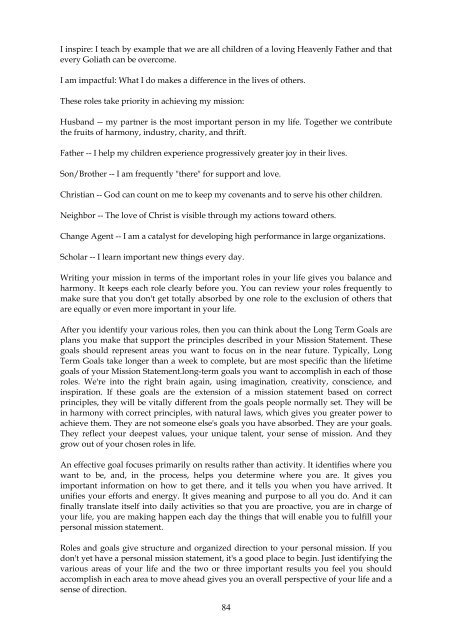Covey - The 7 habits of highly effective people
Create successful ePaper yourself
Turn your PDF publications into a flip-book with our unique Google optimized e-Paper software.
I inspire: I teach by example that we are all children <strong>of</strong> a loving Heavenly Father and that<br />
every Goliath can be overcome.<br />
I am impactful: What I do makes a difference in the lives <strong>of</strong> others.<br />
<strong>The</strong>se roles take priority in achieving my mission:<br />
Husband -- my partner is the most important person in my life. Together we contribute<br />
the fruits <strong>of</strong> harmony, industry, charity, and thrift.<br />
Father -- I help my children experience progressively greater joy in their lives.<br />
Son/Brother -- I am frequently "there" for support and love.<br />
Christian -- God can count on me to keep my covenants and to serve his other children.<br />
Neighbor -- <strong>The</strong> love <strong>of</strong> Christ is visible through my actions toward others.<br />
Change Agent -- I am a catalyst for developing high performance in large organizations.<br />
Scholar -- I learn important new things every day.<br />
Writing your mission in terms <strong>of</strong> the important roles in your life gives you balance and<br />
harmony. It keeps each role clearly before you. You can review your roles frequently to<br />
make sure that you don't get totally absorbed by one role to the exclusion <strong>of</strong> others that<br />
are equally or even more important in your life.<br />
After you identify your various roles, then you can think about the Long Term Goals are<br />
plans you make that support the principles described in your Mission Statement. <strong>The</strong>se<br />
goals should represent areas you want to focus on in the near future. Typically, Long<br />
Term Goals take longer than a week to complete, but are most specific than the lifetime<br />
goals <strong>of</strong> your Mission Statement.long-term goals you want to accomplish in each <strong>of</strong> those<br />
roles. We're into the right brain again, using imagination, creativity, conscience, and<br />
inspiration. If these goals are the extension <strong>of</strong> a mission statement based on correct<br />
principles, they will be vitally different from the goals <strong>people</strong> normally set. <strong>The</strong>y will be<br />
in harmony with correct principles, with natural laws, which gives you greater power to<br />
achieve them. <strong>The</strong>y are not someone else's goals you have absorbed. <strong>The</strong>y are your goals.<br />
<strong>The</strong>y reflect your deepest values, your unique talent, your sense <strong>of</strong> mission. And they<br />
grow out <strong>of</strong> your chosen roles in life.<br />
An <strong>effective</strong> goal focuses primarily on results rather than activity. It identifies where you<br />
want to be, and, in the process, helps you determine where you are. It gives you<br />
important information on how to get there, and it tells you when you have arrived. It<br />
unifies your efforts and energy. It gives meaning and purpose to all you do. And it can<br />
finally translate itself into daily activities so that you are proactive, you are in charge <strong>of</strong><br />
your life, you are making happen each day the things that will enable you to fulfill your<br />
personal mission statement.<br />
Roles and goals give structure and organized direction to your personal mission. If you<br />
don't yet have a personal mission statement, it's a good place to begin. Just identifying the<br />
various areas <strong>of</strong> your life and the two or three important results you feel you should<br />
accomplish in each area to move ahead gives you an overall perspective <strong>of</strong> your life and a<br />
sense <strong>of</strong> direction.<br />
84


